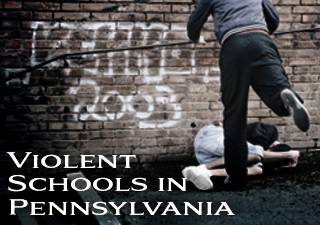Press Release

Research Finds Pa. Kids 5-times as Likely to Suffer Violence at Academically Failing Schools
Children attending Pennsylvania’s worst academically performing public schools are more than 5-times as likely to fall victim to acts of violent crime according to research released today by the Commonwealth Foundation.
Using data from the Pennsylvania Department of Education’s Safe Schools Online, policy analysts at the free-market think tank in Harrisburg examined data from all Pennsylvania school districts, finding more than 18,300 acts of crime occurred in the 2010-2011 school year. More than 3,800 incidents (21 percent of total crimes) occurred at the 140-some public schools scoring in the bottom-5 percent of the Pennsylvania System of School Assessment, including six rapes, 86 indecent assaults, 34 sexual assaults and more than 2,200 assaults on students and staff.
“When children are deprived of a decent education and consistently subjected to horrific acts of violence, it is a legislative and moral imperative to provide parents and educators a way out,” said Commonwealth Foundation President and CEO Matthew J. Brouillette, a former teacher and school board member. “For more than a decade, Pennsylvania’s Educational Improvement Tax Credit has provided thousands of students with opportunity scholarships that saved lives and taxpayer money. Unfortunately, the supply of those scholarships has far outpaced the demand and legislators must act now to correct that inequity.”
Among the highest rates of violence with the lowest rates of academic performance were schools in Allentown, Erie, Harrisburg, Lancaster, Lebanon, Philadelphia, Pittsburgh, Reading and York. Wilkinsburg High School, in the Pittsburgh area, mustered only 16 percent of students at grade level in math, but ranked among the highest in violence at 80 incidents of crime for every 100 students.
According to the Pa. Department of Community and Economic Development data, more than 40,000 students receive scholarships annually through the Educational Improvement Tax Credit (EITC), with the average scholarship amount at $1,100. Under current Pennsylvania law, tax credits provided by businesses in the commonwealth are currently capped at $75 million per year, limiting the scope of the program and creating long waiting lists.
Currently, the Children’s Scholarship Fund Philadelphia turns away 7,000 applicants per year due to lack of EITC funding. A current proposal under consideration, House Bill 2468, would dramatically increase the number of scholarships available to children trapped in violent, failing schools.
“Pennsylvania children might be on summer break now, but they need adults to give them a break for life by expanding a program that has a proven track record of success,” said Brouillette. “The program was born through bipartisan support and there is no reason it shouldn’t expand through the same cooperation that aims to rescue children from violent and failing schools.”
# # #
To interview subject matter experts on EITC and school choice, contact Jay Ostrich, director of public affairs at [email protected].